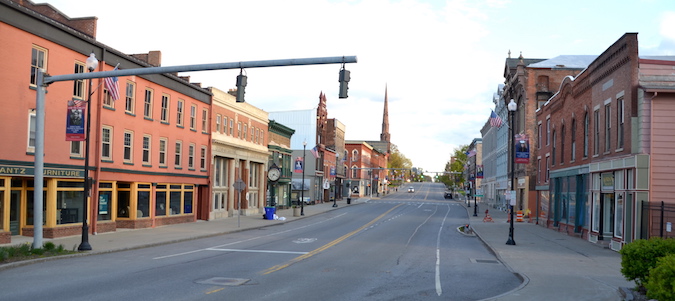Albion proposed law on vacant commercial buildings concerns some property owners
Village holding public hearing today at 6 p.m.

Photo by Tom Rivers: This photo shows Main Street in downtown Albion on an evening in May. The Village Board has proposed a law for vacant commercial buildings where property owners have to pay to be on a vacant building registry and pay annual fees if the sites remain empty.
ALBION — The Village Board wants to encourage commercial building owners to keep their sites occupied. The board sees many of the vacant sites as “unsightly, unsafe and discourages business traffic in the village,” according to a proposed law.
The village will have public hearing today at 6 p.m. to receive feedback about the law that the Village Board says will establish a process for identifying and tracking vacant commercial units, set forth responsibilities for the vacant sites, and to speed the renewed use of the buildings.
Some of the building owners have already sent letters to the Village Board, outlying concerns that the proposed law is unconstitutional and could have the opposite intended effect of making a building too costly to own.
The proposed law applies to commercial buildings in the Central Business District, General Business District, Planned Commercial Development District, Residential Offices/Limited Business Districts or Light Industrial Districts.
The proposed law would require the owner of properties to register the site with the code enforcement officer no later than 30 days after it becomes vacant or no later than 30 days after being sent a notice from the code officer that the building needs to be registered as a vacant building.
The code officer may identify a vacant site through the routine inspection process or through notification by residents, neighborhood associations or community groups that the site may be eligible to be on the vacant building registry.
The owner of the site needs to submit a vacant building plan which could include a plan for securing and maintaining the site if it will remain vacant and a reason why it will be vacant, a rehabilitation plan that shouldn’t exceed 365 days to return the building to appropriate use, or a demolition plan and time frame for demolition.
If the site isn’t maintained, the village has grounds to remediate the building and bill the costs to the owner, revoke the rehabilitation plan, and subject the owner to fines and penalties, according to the proposed law.
The proposed law also says the building owner needs to pay a $250 registration fee to be on the vacant building registry. If the building remains vacant, the owner will be charged an annual vacant building fee of $1,000 for buildings 20,000 square feet or less, or 5 cents per square foot for sites over 20,000 square feet. That would be $1,500 for a 30,000 square foot site, for example.
Conrad Cropsey, owner of the Briggs Building in the downtown, said the proposed law violates due process and doesn’t include grandfather provisions for bringing buildings up to current code, which could make many of the historic buildings “unsalable,” he said in a letter to the board.
“You will end up owning them for taxes and fines,” Cropsey wrote in his Aug. 3 letter to the Village Board. “Your own building (Village Hall) is included if it is not fully used.”
Cropsey, an attorney, said the village also can’t legislate implied “consent” to enter a building.
“The law is that you can enter if there is an emergency to health and safety or you have established a probable cause of a violation of a valid and constitutional law,” Cropsey wrote. “Couple this with several bad and or overly broad definitions and your proposed law is a train wreck waiting for a litigator.”
Cropsey said the board has a good motive in the law but the proposal “is not the way to achieve it.”
Nathan Lyman, another attorney with a building on Main Street, also wrote to the board with his concerns. In his letter on Aug. 2 , he said downtown real estate values haven’t go up in 20 years.
Compared to 1982 when Lyman was a village trustee, the building owners today face less business activity in the downtown, a higher tax burden and “a pandemic where property owners are prohibited by executive fiat from commencing evictions if the rent is not paid.”
Lyman said the board has good intentions with the proposed law, but it comes during a challenging time for the building owners. The proposed law is also unconstitutional, he said.
Many of the buildings have multiple units and could be 75 percent occupied. But by the proposed law’s definition, the building could be required to be registered with the village as a vacant site, Lyman said.
“If I have chosen not to develop the third floor of my building because of fire code requirements, what right does the Village have to call the building vacant because that area is empty and not viable from an economic perspective?” Lyman wrote. “The same is true of Five Star Bank building, which does not utilize the space on the second and third floors of their building. The determination of the Code Enforcement Officer could easily lead to challenges based upon the subjective vagueness in definitions and selective enforcement by the Village.”
Lyman said requiring owners to register makes them give up their Fourth Amendment right to be free from unreasonable search and seizure – “By registering a building, an owner consents to an Enforcement Officer inspecting the premises…”
The Village Board would be putting taxpayers at risk for costly litigation with the law, which Lyman said wouldn’t stand up in court.
The village also can’t mandate a storefront to be occupied, “or that the property owner magically generate a rent-paying tenant or else pay a penalty to the Village,” he wrote in his letter.
The village can, however, enforce health and safety regulations such as the building code, but it does not have the right to compel a property owner to lease or occupy a building, Lyman said.
“So long as the building, which is already subject to safety and fire inspection, meets those codes and pays the real property taxes, the village cannot mandate that a storefront be occupied, much less assess a fee if it is not,” he said.
Lyman said the business climate in Albion “is challenged at best.” The Covid-19 lockdowns “decimated” many small businesses in downtowns. In Albion, “the building inventory does not meet the requirements of national franchises, which is why none are located downtown,” he said.
He said putting a vacant building on a registry would likely further diminish the value of the site and could result in a lower tax assessment and hurting the village’s tax base.
“I am reminded of the adage that it is easier to attract flies with honey than with vinegar,” Lyman said. “Isn’t it a wiser strategy to do positive things to help the business community which is struggling to recover from pandemic mandates, as opposed to adopting more punitive mandates?”





































































